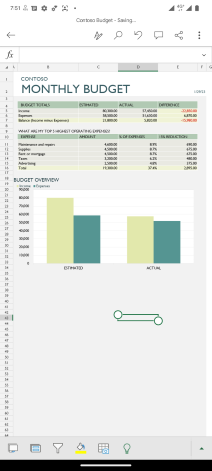Microsoft Excel
Microsoft Excel is a spreadsheet application developed by Microsoft for Microsoft Windows, macOS, Android, and iOS. It features calculation, graphing tools, pivot tables, and a macro programming language called Visual Basic for Applications (VBA). Excel forms part of the Microsoft Office suite of software.
History[edit | edit source]
Microsoft Excel was first released in 1985 for the Apple Macintosh. The first Windows version was released in November 1987. Excel has since become the dominant spreadsheet application for both personal and professional use, surpassing competitors such as Lotus 1-2-3.
Features[edit | edit source]
User Interface[edit | edit source]
Excel's user interface includes a grid of cells organized in numbered rows and letter-named columns to organize data manipulations like arithmetic operations. It allows users to create complex formulas to perform calculations on data.
Formulas and Functions[edit | edit source]
Excel provides a wide range of built-in functions for statistical, engineering, and financial needs. Users can create custom formulas using these functions to perform calculations on data sets.
Data Visualization[edit | edit source]
Excel offers various tools for data visualization, including charts, graphs, and conditional formatting. These tools help users to present data in a visually appealing and understandable manner.
Pivot Tables[edit | edit source]
Pivot tables are a powerful feature in Excel that allow users to summarize, analyze, explore, and present summary data. They are particularly useful for large data sets.
Macros and VBA[edit | edit source]
Excel supports automation of tasks through macros and VBA. Users can write scripts to automate repetitive tasks, create custom functions, and interact with other applications.
Applications[edit | edit source]
Excel is widely used in various fields such as finance, accounting, data analysis, and project management. It is a versatile tool for budgeting, forecasting, and data management.
Compatibility[edit | edit source]
Excel files are saved in the Office Open XML format, with the .xlsx extension. It is compatible with other spreadsheet applications, although some features may not be fully supported in non-Microsoft applications.
Criticism[edit | edit source]
Excel has been criticized for its potential to introduce errors in data analysis due to user mistakes or limitations in its design. It is also noted for its lack of advanced data management capabilities compared to dedicated database systems.
Also see[edit | edit source]
Search WikiMD
Ad.Tired of being Overweight? Try W8MD's physician weight loss program.
Semaglutide (Ozempic / Wegovy and Tirzepatide (Mounjaro / Zepbound) available.
Advertise on WikiMD
|
WikiMD's Wellness Encyclopedia |
| Let Food Be Thy Medicine Medicine Thy Food - Hippocrates |
Translate this page: - East Asian
中文,
日本,
한국어,
South Asian
हिन्दी,
தமிழ்,
తెలుగు,
Urdu,
ಕನ್ನಡ,
Southeast Asian
Indonesian,
Vietnamese,
Thai,
မြန်မာဘာသာ,
বাংলা
European
español,
Deutsch,
français,
Greek,
português do Brasil,
polski,
română,
русский,
Nederlands,
norsk,
svenska,
suomi,
Italian
Middle Eastern & African
عربى,
Turkish,
Persian,
Hebrew,
Afrikaans,
isiZulu,
Kiswahili,
Other
Bulgarian,
Hungarian,
Czech,
Swedish,
മലയാളം,
मराठी,
ਪੰਜਾਬੀ,
ગુજરાતી,
Portuguese,
Ukrainian
Medical Disclaimer: WikiMD is not a substitute for professional medical advice. The information on WikiMD is provided as an information resource only, may be incorrect, outdated or misleading, and is not to be used or relied on for any diagnostic or treatment purposes. Please consult your health care provider before making any healthcare decisions or for guidance about a specific medical condition. WikiMD expressly disclaims responsibility, and shall have no liability, for any damages, loss, injury, or liability whatsoever suffered as a result of your reliance on the information contained in this site. By visiting this site you agree to the foregoing terms and conditions, which may from time to time be changed or supplemented by WikiMD. If you do not agree to the foregoing terms and conditions, you should not enter or use this site. See full disclaimer.
Credits:Most images are courtesy of Wikimedia commons, and templates, categories Wikipedia, licensed under CC BY SA or similar.
Contributors: Prab R. Tumpati, MD




